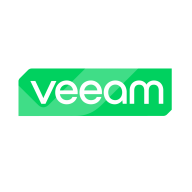

Teradata and Veeam Data Platform are major players in the enterprise data management and backup solutions market. While Teradata excels with its handling of large data volumes and analytics, Veeam seems to have the upper hand with its comprehensive data protection and ease of deployment in diverse environments.
Features: Teradata is acclaimed for its parallel processing and optimization techniques, excellent scalability, and flexible architecture that efficiently manages large data volumes. It offers advanced features like partitioning and workload management, making it ideal for complex data environments. In contrast, Veeam Data Platform is recognized for its efficient backup and replication capabilities, seamless integration across multiple environments, and ease of restore. It simplifies deployment and provides instant recovery options, enhancing overall data protection.
Room for Improvement: Teradata users suggest improvements in cloud integration and cost-effectiveness, highlighting its pricing and complexity as areas needing refinement. Enhancements in handling unstructured data and cloud solutions are also desired. Veeam Data Platform users indicate a need for more affordable pricing models and better cloud and SaaS integration support. They also seek improved disaster recovery features and scalability, especially for non-Windows environments.
Ease of Deployment and Customer Service: Teradata is primarily deployed on-premises with a growing interest in hybrid cloud models, leveraging its scalable architecture. Its technical support is praised for expertise but can sometimes be slow in issue resolution. Veeam Data Platform offers strong support in both on-premises and cloud deployments. Users value its ease of deployment and commend the support team for effectiveness, although response times could improve.
Pricing and ROI: Teradata is often considered costly, justified by its features and performance in sophisticated analytics environments, but more competitive pricing could attract a wider market. Positive ROI is seen due to enhanced organizational efficiency and service delivery. Veeam Data Platform offers cost-effective solutions with flexible licensing adaptable to business needs. It is praised for reasonable pricing and incremental cost increases, reflecting strong ROI through effective data security and resource reduction.
At least fifteen to twenty percent of our time has been saved using Teradata, which has positively affected team productivity and business outcomes.
Independent research showed that Teradata VantageCloud users achieved an average ROI of 427% across three years with payback under a year, demonstrating the platform's ability to deliver a strong financial return.
We have realized a return on investment, with a reduction of staff from 27 to eight, and our current return on investment is approximately 14%.
The customer support for Teradata has been great.
They are responsive and knowledgeable, and the documentation is very helpful.
Customer support is very good, rated eight out of ten under our essential agreement.
Most cases are handled perfectly.
I would rate their technical support a 10 out of 10.
The escalation from first, second to third tier is sometimes very long-lasting, but the resolve rate is quite high.
Whenever we need more resources, we can add that in Teradata, and when not needed, we can scale it down as well.
This flexibility allows organizations to scale according to their needs, balancing performance, cost, and compliance requirements.
This expansion can occur without incurring downtime or taking systems offline.
It involves acquiring additional licenses as needed.
I would rate the scalability part of Veeam Data Platform 10 out of 10 because we have the ability to scale out the product at any time with scale-out backup repositories and can add licenses as needed.
In order to scale Veeam Data Platform, we have to pay a lot more money.
Its massively parallel process architecture allows the platform to distribute workload efficiently, enabling organizations to run heavy analytic queries without compromising speed or stability.
I find the stability to be almost a ten out of ten.
The workload management and software maturity provide a reliable system.
There are no issues with stability in Veeam Data Platform.
I can say the stability of Veeam Data Platform is almost 8 to 9, as the cluster functionality was not there in earlier platforms such as version 12, but is provided in version 13.
I want to highlight two features for improvement: first, storing data in various formats without requiring a tabular structure, accommodating unstructured data; and second, adding AI ML features to better integrate Gen AI, LLM concepts, and user-friendly experiences such as text-to-SQL capabilities.
Unlike SQL and Oracle, which have in-built replication capabilities, we don't have similar functionality with Teradata.
The most challenging aspect is finding Teradata resources, so we are focusing on internal training and looking for more Teradata experts.
The improvement we would like to see is the option to scale Veeam Data up in smaller sections rather than large sections, which requires paying much more.
Reducing it by 20% would make it more accessible to a broader range of customers.
OpenStack is something Veeam Data Platform doesn't support, and they haven't indicated that they will support it in the future.
Teradata is much more expensive than SQL, which is well-performed and cheaper.
Initially, it may seem expensive compared to similar cloud databases, however, it offers significant value in performance, stability, and overall output once in use.
Role-based access control (RBAC), strong audit and compliance features, high availability, fault tolerance, and encrypted data at rest and in-transit are key features.
I don't consider the price expensive given its importance.
A reduction of 20% in the current cost would make the solution more attractive to clients.
Veeam Data Platform is more expensive than OpenStack because we pay for it in US dollars, while we pay for OpenStack in Egyptian pounds.
Teradata's security helps our organization meet compliance requirements such as GDPR and IFRS, and it is particularly essential for revenue contracting or revenue recognition.
Its architecture allows information to be processed efficiently while maintaining stable performance, even in highly demanding environments.
It facilitates data integration, where we integrate and analyze data from various sources, making it a powerful and high-quality reliable solution for the company.
The platform is user-friendly, comprehensive, and compatible with numerous market solutions, including virtualization and bare metal servers.
The most important aspect of this platform is data security with immutable data in the storage.
Veeam Data Platform is valuable for its stability and the ability to easily contact support for assistance.
| Product | Market Share (%) |
|---|---|
| Veeam Data Platform | 7.6% |
| Teradata | 0.5% |
| Other | 91.9% |


| Company Size | Count |
|---|---|
| Small Business | 28 |
| Midsize Enterprise | 13 |
| Large Enterprise | 52 |
| Company Size | Count |
|---|---|
| Small Business | 217 |
| Midsize Enterprise | 99 |
| Large Enterprise | 139 |
Teradata is a powerful tool for handling substantial data volumes with its parallel processing architecture, supporting both cloud and on-premise environments efficiently. It offers impressive capabilities for fast query processing, data integration, and real-time reporting, making it suitable for diverse industrial applications.
Known for its robust parallel processing capabilities, Teradata effectively manages large datasets and provides adaptable deployment across cloud and on-premise setups. It enhances performance and scalability with features like advanced query tuning, workload management, and strong security. Users appreciate its ease of use and automation features which support real-time data reporting. The optimizer and intelligent partitioning help improve query speed and efficiency, while multi-temperature data management optimizes data handling.
What are the key features of Teradata?
What benefits and ROI do users look for?
In the finance, retail, and government sectors, Teradata is employed for data warehousing, business intelligence, and analytical processing. It handles vast datasets for activities like customer behavior modeling and enterprise data integration. Supporting efficient reporting and analytics, Teradata enhances data storage and processing, whether deployed on-premise or on cloud platforms.
Veeam Data Platform is a leader in data resilience, providing businesses with reliable and secure backup, recovery, and advanced data insights. It is designed to combat today's cyber threats while ensuring data remains protected, adaptable, and recoverable.
Engineered to offer a seamless and powerful data resilience experience, Veeam Data Platform helps organizations with intelligent protection beyond just backup. It enables orchestrated and verifiable recovery processes, helping maintain continuous operations. By offering integrated solutions against evolving cyber threats, this platform assures businesses of data availability and precision restoration, empowering them to remain resilient under any circumstances. Its robust security features, coupled with efficient replication and deduplication benefits, deliver confidence in data management across hybrid and cloud deployments.
What features make Veeam Data Platform stand out?Veeam Data Platform is primarily used for managing backup and replication across VMware and Hyper-V environments, supporting both cloud and on-premises infrastructures. In industries managing significant IT services, it assists in disaster recovery and virtual machine protection, enhancing business continuity. Its integration with applications like Microsoft Office 365 ensures reliable data protection and quick recovery, making it beneficial for those looking to streamline operations across diverse deployment scenarios.
We monitor all Backup and Recovery reviews to prevent fraudulent reviews and keep review quality high. We do not post reviews by company employees or direct competitors. We validate each review for authenticity via cross-reference with LinkedIn, and personal follow-up with the reviewer when necessary.